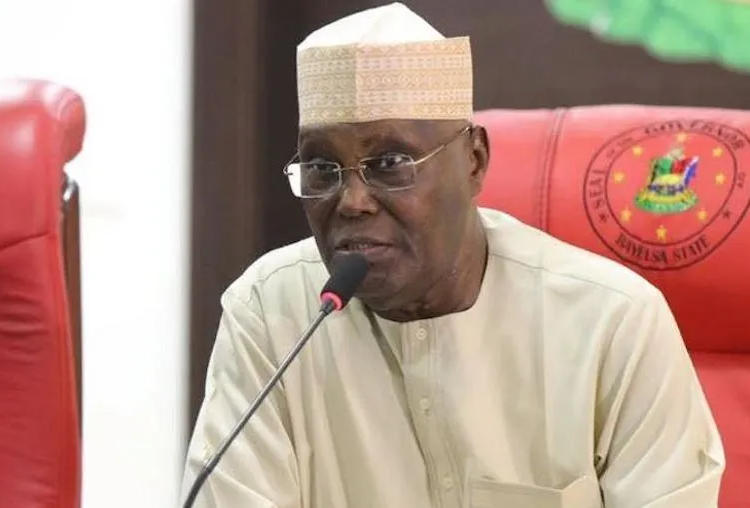Former Vice President Atiku Abubakar said Nigeria needs to open up the entire power sector from generation to transmission for private investments to help the sector thrive.
He also stressed the need for the federal and state governments to ensure a conducive business environment for investors in the power sector to operate.
Atiku said this against the backdrop of the recent commissioning of the 188MW Geometric Power Plant in Aba, Abia State. The power plant is to supply electricity to a section of Aba, popularly called the Enyimba City.
The PDP presidential candidate in 2023 commended the establishment of the plant and said Nigeria must double efforts to support its owner, Prof Barth Nnaji and others who would want to invest in the sector.
He said federal and state governments must provide the business environment that will make the private enterprises more competitive by reducing their costs of set-up and operations; improving their margins; and making government policies more predictable.
Atiku said the authorities must create an environment that will enable distribution companies to recover full costs for power supplied to their consumers with firm commitment to a metering program for all customers
Atiku on his X handle yesterday said although the Aba Power plant took two decades in coming, the much-needed electricity to unleash the full potentials of Aba, the industrial and commercial nerve centre of Abia, will surely make up for the long wait.
Atiku congratulated and appreciated the efforts of Nnaji and his team to deliver on this project despite all the (political and) business environment obstacles, adding that his tenacity and demonstration of the ‘can-do spirit’ is exemplary.
He said it is remarkable that the Abia State governor Alex Otti stayed the course of the project that he had initial contributed to as a private sector person just as he congratulated the enterprising people of Abia.
“This significant milestone is important for a number of reasons. Firstly, it improves peoples access to electricity – and thereby improves the overall quality of life of the people of Abia. This is a privilege the people of Abia must be thankful for. As we all know, more than 40% of Nigeria’s 220 million people do not have access to electricity.
“Secondly, it is a big boost to businesses. Aba is one of Southeast’s industrial nerve centres. The other is the Nnewi axis. Inadequate power infrastructure is identified as the most problematic factor for doing business in Nigeria. More than 70% of firms in Nigeria use generators.
“Thirdly, the project is delivered by the private sector – and an indigenous one to boot! It demonstrates the resilience of the private sector despite all the business environment issues. It also demonstrates the capacity of the local private sector to deliver on such huge and complex projects.”
Atiku said he is excited by the realisation of the power project because he has been concerned that the Nigerian Electricity Supply Industry (NESI) has over the years suffered from inadequate investments, failure of generation, transmission, and distribution infrastructure.
He added, “Nigeria’s core infrastructure stock is very low, estimated at 35-40% of GDP, below the international benchmark of 70% and below South Africa 87%, Indonesia 70%, China 76% and India 58%.
“The finances required to bridge Nigeria’s infrastructure gap are in the region of US$100 billion per annum – over the next 30 years. Nigeria does not have the resources to provide all of its infrastructure needs without sacrificing investments in education, health, and other social services. It should be remembered that Nigeria struggles to budget no more than US$30 billion annually.”
He said for the aforementioned reasons, he had been an ardent advocate of private sector presence in Nigeria, adding that he had all along advocated for a private sector friendly business environment so that the country could leverage its enormous resources, including finance, skills, and technology.
“I doubt if the Abia state government would have been able to execute this mega project with the resources at its disposal.
“My policy document outlines how Nigeria could prioritize investments to increase the stock and improve the quality of economic and social infrastructure across the country. We believe that narrowing the enormous gap that exists between the demand and supply of key infrastructure facilities in Nigeria is key to improving the competitiveness of our businesses, opening new economic and entrepreneurial opportunities, and promoting enterprise growth.
“To achieve this, we pledged to undertake far-reaching institutional reforms and introduce innovative infrastructure financing models that will be appealing to the private sector to take risks and invest capital.
“To this end, we pledged to:
Facilitate the establishment of a private sector-led Infrastructure Debt Fund (IDF) to mobilize domestic and international private resources for the financing and delivery of large infrastructure projects across all sectors of the economy.
“Establish an “Infrastructure Development Unit” (IDU) in the Presidency, with a coordinating function and a specific mandate of working with the MDAs to fast track and drive the process of infrastructure development in the country.
“Strengthen the capacity of the ICRC to promote Public Private Partnerships (PPP) in the construction and management of infrastructure across the country.
“Broaden the scope of InfraCredit to complement the operation of the IDF by de-risking investments in infrastructure to build investor confidence in taking risks and investing capital.
“Open up the entire power sector from generation to transmission for private investments.”
Going forward, Atiku said the goal of every developing country must be to achieve universal access to electricity, ensuring that every citizen benefits from reliable power for daily needs, education, healthcare, and economic activities.
“This would be in line with the SDG 7 (Sustainable Development Goal 7), which aims to ensure affordable, reliable, sustainable, and modern energy for all. In this wise:
“Nigeria must double efforts to support the likes of Prof Nnaji. Nigerian governments both federal and state must provide the Business environment that will make the private enterprises more competitive by (1) reducing their costs of set-up and operations (2) improving their margins and (3) making government policies more predictable.
“In particular, the authorities must create an environment that will enable distribution companies to recover full costs for power supplied to their consumers with firm commitment to a metering program for all customers. The scourge of electricity theft must be dealt with through a viable partnership between investors in the distribution companies and the government with legislative support for prompt action against electricity theft.
“Attention must be paid to improve access to Credit by enterprises willing to invest in the power sector.
“Government must incentivize the private sector to increase greenfield investments in the development of off-grid solutions to intensify electrification, particularly of rural communities not yet serviced by the grid,” he said.





